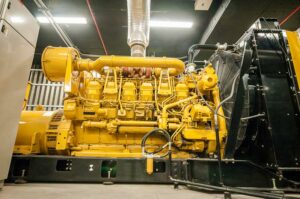
Buying a commercial generator for your facility is a great investment for your business. However, if you’ve never purchased a generator, it might be hard to know where to start. Choosing the right generator unit for your needs can be a complex process. There are many things to consider about your business and different generator units. Fortunately, we have a basic guide to help you as you look at your options.
Why Invest in a Commercial Generator?
If you don’t already have one, why buy a commercial generator? There are many benefits to having a standby generator for your business. Whether you’re a small mom-and-pop shop or a large location of a major corporation, power outages put your business at risk. Generators use an engine to create their own electricity to provide power when utility power fails.
Power outages happen for many reasons. Your business might lose power for downed lines, storms, extreme weather events, or even human error. Unfortunately, any power outage can mean lost business, lost productivity, or even lost product for your business. A generator can help provide returns on investment by preventing these losses during unexpected power outages. A commercial generator can help with business continuity even when the electricity goes out.
Buy a Commercial Generator: New or Used?
One of the first things to consider is whether you want to buy a new or a used generator. There are pros and cons for both. New generators typically come with limited manufacturer warranties and are completely new to your facility. Used generators typically have a low number of run hours from another facility. Then generator experts service the unit before they’re sold for a discount. Therefore, used generators are often ideal for lower budgets. You can get a larger or nicer unit for less because units are pre-owned.
Another benefit of buying used generators is that they are typically immediately available. In many cases, lead time on a new generator is much longer than used units. Used generators can ship immediately from storage or from the service shop for faster delivery times.
Questions to Ask about Your Commercial Generator Needs
Once you know whether you want a new or a used generator, you can start narrowing down certain criteria. This can help you determine what your generator needs are. Understanding what you require from a generator can help you pick a specific unit that suits your facility. Ask yourself some questions about your commercial building’s generator needs. If you need help, ask your generator dealer or a qualified electrician to help you answer these questions.
What Power Capacity Does My Facility Need?
First, consider what your capacity needs are. Each commercial generator is rated for a certain amount of electricity it can provide. This generally comes down to the type of generator and the size of the engine. You want to consider exactly how much power you need from your generator and choose a generator that is sized and rated for that capacity. Generally, commercial and industrial generators are rated in kilowatts. They may also have different ratings for different applications, such as standby or prime. For a backup generator for your business, you most likely want to look at the standby capacity rating.
Also, let’s not forget that your power needs may change with time. Of course, you don’t want to choose a generator that is significantly oversized for your facility. This can drive up costs and also may lead to a shorter lifespan for your generator. However, you may want to build in some extra capacity to suit future needs, such as if you end up adding an extra piece of equipment. So, don’t forget to also think about potential capacity needs in the near future as well when selecting a commercial generator.
What Equipment and Systems are Essential?
In some cases, commercial buildings choose standby generators rated to run every electrical system or piece of equipment in the building. Sometimes this is most practical. However, in other cases you may want to pick and choose what stays on during a power outage. You can certainly do this. The electrician who installs your generator can actually wire the unit to run only those areas of the electrical system. If this is the path you want to take, then you need a list of all the systems and equipment that you think are essential during a power outage. For instance, you might choose to keep the emergency lights on as well as certain pieces of equipment, but not, say, a printer that you rarely use. It’s more complex than this, but it’s a good example of how you might want to pick and choose what the generator powers.
A Note on Starting Wattage and Continuous Wattage
As you consider what equipment and systems are important for your business and will be powered by your generators, it’s important to talk about starting and continuous wattage. Many pieces of electrical equipment actually need more power to start up than to simply run. This is the starting wattage. After starting up, the equipment typically needs fewer watts to simply continue to run, which is the continuous wattage. You want to make sure you have both of these totals before choosing a generator. In some cases, you may lose power and your generator will need to be able to provide enough electricity for starting wattage for all your essential systems and equipment.
What Commercial Generator Fuel Type is Right for Your Business?
Another big consideration for your commercial generator is the fuel type that’s best for your facility. There are many different fuels to choose from, but two of the most common are diesel generators and natural gas generators. Diesel generators are by far the common because it’s a pretty efficient fuel in that it burns for longer. However, these tend to be a little noisier and you must keep diesel fuel on-site to power the generator. Also, diesel does need to be replaced about every two years or so.
Natural gas generators are another common option, though you do need access to gas in your facility to use them. Building in the infrastructure for natural gas when it doesn’t already exist for your facility can be incredibly expensive and disruptive to your business. Natural gas generators use a cleaner fuel source. However, natural gas service can be cut off just like electricity, particularly after natural disasters. So, keep this in mind as well.
Now, you might be wondering about gasoline. It’s what fuels most of our vehicles and is pretty inexpensive and accessible. However, gasoline burns incredibly fast. In many cases, gasoline just isn’t practical because you would need to keep so much on hand for even just a short-term outage.
Generator Country – Specializing in Commercial & Industrial Generators
When you need a trustworthy generator dealer, our team at Generator Country is here for you. We are leading the industry in used generators for commercial and industrial applications. Our team can help identify your generator needs and find the ideal unit for your needs and budget. We provide top service whether you need to buy or sell an industrial generator. Reach out now to discuss your generator needs.

